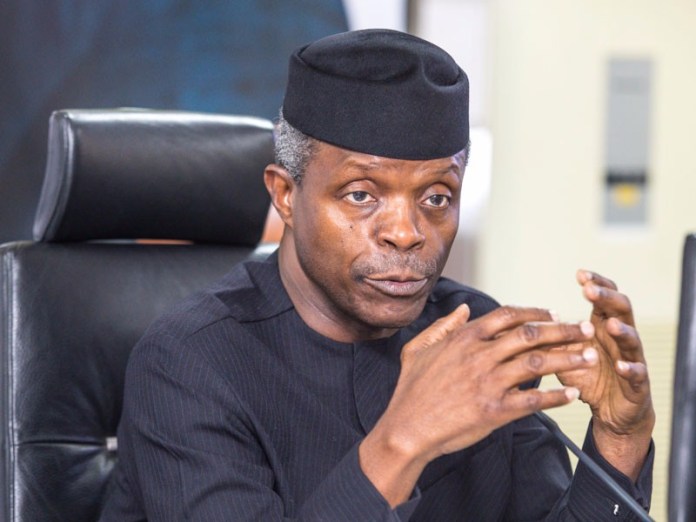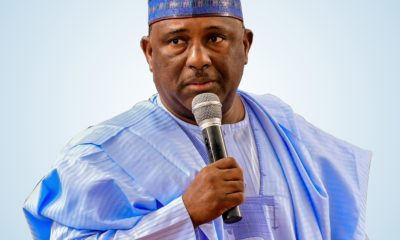- Osinbajo Commissions Fertilizer Plant, BUA Cement Factory in Edo
Vice President, Yemi Osinbajo on Tuesday inaugurated the 60,000 metric tonnes per annum Edo State Fertilizer Plant, Auchi; and a two million metric tonnes per annum BUA Cement Plant at Okpella,in Etsako West and Etsako East Local Government Areas of the state.
Inaugurating the BUA cement plant, the vice president said: “The construction of this plant is of course a big boost to the Nigeria economy, it will provide thousands of direct and indirect jobs both for skilled and unskilled workers from the commencement of the construction of the plant to the smooth running of the operations process.”
According to him, at the level of production obtained, it also means the consolidation of the Nigeria’s self-sufficiency in cement and a big boost to our export capacity.
“I am happy to note that for the construction of power production facility for this plant, the BUA group has used the most modern and efficient gas turbine which combines low and economically value cost with a very high degree of reliability.”
In Auchi, Osinbajo inaugurated the Edo Fertilizer Plant and Chemical Company Limited, a public, private venture which has the capacity to produce about 60,000 metric tones of fertilizer per annum.
The vice president who was accompanied by the Ministers of Agriculture and Rural Development, Chief Audu Ogbeh; and Industry, Trade and Investment, Dr. Okechukwu Enelamah, commended the foresight of the Edo State Governor, Mr. Godwin Obaseki, for creating the enabling business environment which saw to the revitalisation of the fertilizer plant which had been non-functional for about 14 years.
Osinbajo expressed delight at the 500 direct jobs that have been created by the investment, stressing that much more employment opportunities would result from the ancillary economic activities that would be generated by the fertilizer plant.
Commending the governor for having the right attitude to development, he called on leaders across the country in different areas to dedicate themselves to activities that will improve the lot of their people.
“The President Muhammadu Buhari administration is committed to making it easy for investors to do business in the country. We want to achieve this through the promotion of transparency and efficiency. We want every state to be involved in this drive and create the enabling environment for business to thrive in their domain,” Osinbajo said.
He said the revitalisation of fertilizer blending plants across the country was the direct consequence of the presidential initiative to diversify the economy from crude oil, boost farming activities as well as develop the agricultural value chain.
The vice president added that agricultural activities in the country could be enhanced significantly if there was improved access to inputs, hence the drive to make fertilizer which is a major farm input, easily available and accessible to farmers in Nigeria.
Osinbajo explained that the blending plant would also complement Obaseki’s agricultural development initiative which is aimed at improving investment in agriculture via public private partnership (PPP) as well as creating jobs for youths across the three senatorial districts of the state.
In his remarks, Obaseki said the inauguration of the fertilizer plant signified a milestone in his administration as the facility was never operated for a day after it was fraudulently launched by the opposition party about 14 years ago.
He said what the opposition could not do for nearly a decade, his government, with the support of the Edo people, has done it in only about nine months.
The governor said: “The aim of revitalising this plant is to make the state self-sufficient in food production and enable farmers get fertilizer at affordable prices. We in Edo State are determined to make food available in the country.”
He added that the facility would go a long way in providing fertilizer for neighbouring states such as Kogi, Delta, Ondo and Anambra, among others as it was the only blending plant in the region.
Obaseki commended the leadership role played by the federal government in the execution of the Presidential Fertilizer Initiative as well as the management of WACOT for partnering the Edo State Government in revamping the plant.
“This achievement is an open call to other investors to bring in new technology, create more jobs and expand our economic opportunities,” he said.
The governor called on the traditional ruler, Otaru of Auchi; the community where the plant is located, to ensure the protection of the facility against vandalism as it creates a large range of opportunities for businesses in the community and the state.
Also speaking the Group Managing Director of WACOT, Mr. Rahul Savara, commended the Vice President for ianuguration the plant and governor Godwin Obaseki for fostering the partnership between the state and his company.
He said the presidential fertilizer initiative has made local production feasible and sustainable in the country, assuring that the Edo Fertilizer and Chemical Company would be made up of 95 per cent indigenous workers.
Speaking of the numerous benefits of having a fertilizer blending plant in the state, the Deputy Governor of Edo, Rt. Hon. Philip Shaibu said: “Many jobs will be created, it will boost business activities, farmers will no longer go through undue hardship before they get fertilizer to buy and productivity will increase. We are keying into the federal government policy to make fertilizer affordable and available in the country.”
In his remarks, the Otaru of Auchi, Alhaji Aliru H. Momoh, Ikelebe the III, said the inauguration of the plant demonstrates Governor Obaseki’s zeal to improve the economy as well as industrialise the state.
“The governor brought in people to revamp this plant and told us at the palace that within three months, it will become functional, we taught it was a joke, but thanks to Allah that we are here to witness the commissioning of the plant,” the traditional ruler said.


 Billionaire Watch3 weeks ago
Billionaire Watch3 weeks ago
 Startups4 weeks ago
Startups4 weeks ago
 News4 weeks ago
News4 weeks ago
 News4 weeks ago
News4 weeks ago
 Bitcoin4 weeks ago
Bitcoin4 weeks ago
 Naira4 weeks ago
Naira4 weeks ago
 Forex3 weeks ago
Forex3 weeks ago
 Treasury Bills4 weeks ago
Treasury Bills4 weeks ago
























